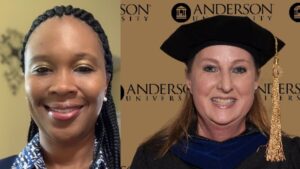In the fully-online Doctor of Philosophy in Leadership program, working professionals explore complexities and challenges within organizations of all kinds. Here’s a look at a few of the Ph.D. graduates who successfully defended their dissertations and received their doctoral degrees during Winter Commencement December 15, 2023.
Dr. Sharon Black’s research grew out of what she has seen in her many years of community health experience. Dr. Black, who is director of Integrated Behavioral Services at Hope Health in Florence, South Carolina, researched challenges faced by African American women in leadership roles across the state at Federally Qualified Community Health Centers (FQHC).
“They talked about the lack of diversity. Especially as you go higher up the ladder, there were fewer people who looked like them,” she said. “In the FQHC world, when you look at the population that we serve, the higher you go up the ladder, it doesn’t always represent the population it serves.”
Women leaders she interviewed talked about misconceptions which included things like tone of voice and body language, asserting that they are mistakenly seen by their colleagues as angry when, more accurately, their response is “I’m just passionate about what I do.” She also tackled the issue of a lack of mentors for African American women in leadership, something she experienced early in her career.
Of her own experiences, Dr. Black said, “I felt like I had to go and find my own resources just to be a better leader. Because I didn’t have those things in place really kind of put me at a disadvantage, although I persevered and found resources for myself, but I didn’t have that person saying ‘these are things you should do as a leader.’”
Dr. Black feels that her Ph.D. work has been rewarding and she hopes to help other women like her who are navigating the complexities of leadership.
Dr. Jennifer Suber’s research was titled COVID Implications for Southeastern States: A Thematic Analysis of Influences from Leaders, Health Agencies and Social Media platforms. She examined social media activity in her thematic analysis that compared and contrasted social media tweets during the height of the pandemic from three sources: the President of the United States, the Centers for Disease Control (CDC) and the National Institute of Allergy and Infectious Diseases (NIAID). She also analyzed statistics on the number of days it took states to implement public mask mandates.
When she was looking into doctoral programs, Dr. Suber, who works as a Post-merger Integration Specialist at Bosch, felt that going out of state wasn’t going to be an option. Then she discovered the Doctor of Philosophy in Leadership program at Anderson University.
“I travel a lot for work, and then I also have a family… you’ve got to find that balance,” she said. “When you go out of state, you’re looking at increased cost, because you’re paying out-of-state tuition. Also, a lot of the programs are one or two weeks per summer or per session—it’s just added costs because you’ve got to pay for hotels and you’ve got to pay to fly in or drive in, however you plan to get there.”
“I always am a big advocate for education,” she said. “I thought about maybe doing some adjunct teaching going forward. Certainly the leadership degree will help just within my own career today.”
Dr. Coleman Smoak looked at pursuing doctoral work as his retirement was approaching from a career of 44 years in the community-owned utility field.
His research focused on doctrinal literacy among lay leaders in Southern Baptist churches. Dr. Smoak interviewed pastors and ministry leaders at 10 churches in the same Baptist association to determine if lay leaders are assessed on matters such as knowledge of Baptist doctrine and specifically the Baptist Faith and Message.
“I just talked to them about how they go about ensuring that their lay leaders have the right knowledge, have the right motivation and how they determine whether these people indeed have a knowledge of Southern Baptist doctrine,” he said. He found that while ministers were concerned about apathy and complacency among their congregants, little was actually being done to address the issue among lay leaders. Dr. Smoak hopes that his research will spur on additional research and that both pastors and lay leaders would “step up” to improve assessment and training.
Dr. Smoak is grateful that he found the Doctor of Philosophy in Leadership program offered by the Center for Leadership and Organizations. He said the program not only takes into account his previous master’s work, but also his years of professional experience.
“I have always been a lifelong learner, so I was interested in learning some more, plus I was looking for a challenge,” he added. “I think it will affect the way I work in my local church, the way I view Bible study… and I think it’s going to affect me talking with the lay leadership about ways we can do things differently.”

Pictured (from left): Sharon Black and Jennifer Suber.
The Anderson University Center for Leadership and Organizations
The Doctor of Philosophy in Leadership is a purely online degree program and is designed to equip individuals for the highest level of scholarship and leadership in business, ministry, education, public service, healthcare and non-profit organizations.
This program is designed to prepare working professionals to understand and analyze the complexities and challenges of leading organizations. The program offers a focus on strategy and change in creatively leading complex organizations. Details can be found online.

